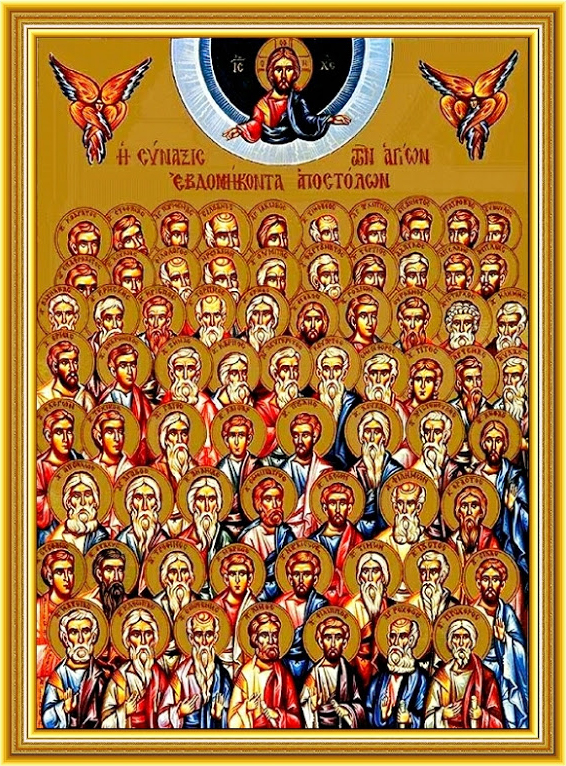Christian Art | Jesus Chooses Twelve Apostles
Mark 3: 13-19 – Week 2 Ordinary Time, Friday (Audio Bible KJV, Spoken Word)
13 And he goeth up into a mountain, and calleth unto him whom he would: and they came unto him.
14 And he ordained twelve, that they should be with him, and that he might send them forth to preach,
15 And to have power to heal sicknesses, and to cast out devils:
16 And Simon he surnamed Peter;
17 And James the son of Zebedee, and John the brother of James; and he surnamed them Boanerges, which is, The sons of thunder:
18 And Andrew, and Philip, and Bartholomew, and Matthew, and Thomas, and James the son of Alphæus, and Thaddæus, and Simon the Canaanite,
19 And Judas Iscariot, which also betrayed him: and they went into an house.
Jesus chooses his core group of disciples, the Apostles, who will live and travel with him and to whom Jesus will impart his deepest and most extensive teachings. While Jesus speaks mysteriously, in parables, to the majority of his listeners, the Apostles will be privy to the hidden meanings of his words, the parables explained, albeit they will often fail to understand or be able to accept what Jesus tells them.
We can understand the importance of the Apostles’ living and travelling with Jesus, as they learn, when we consider our own continual development and growth in relationship with Jesus. Jesus’ teachings are not merely rules we can memorize, as by rote, and then apply to our lives, job done. To begin with, there is no great long list of how we ought to behave in every circumstance. This would be impossible. There is no New Covenant reprise of the rules for living laid down in the Pentateuch, while rules that are there are refuted.
Our calling, our conversion, really does then require us to develop our relationship with Christ. We too need to walk with him, and to engage over a period of time – our whole lives – with his story and teachings, teachings which are often very challenging, provocative or difficult to grasp, and which at times can seem mutually contradictory. There is conversation with Jesus built into the Gospels. It is through our personal knowledge and love of Jesus that his words cohere and become for us the path of salvation – love of and obedience to Christ finally being all.
The Apostles travelled the path with Jesus. They learned to know Jesus, and so they were enabled to pass on this intimate knowledge through the Church, to found those first Christian communities whose gift of faith we inherit. This is a living faith, in which we are free agents, called to make rational choices about our lives, in accordance with the principles Jesus embodied in his life. It is far more than mere ‘letter of the law’.
19 Now therefore ye are no more strangers and foreigners, but fellowcitizens with the saints, and of the household of God;
20 And are built upon the foundation of the apostles and prophets, Jesus Christ himself being the chief corner stone;
21 In whom all the building fitly framed together groweth unto an holy temple in the Lord:
22 In whom ye also are builded together for an habitation of God through the Spirit. (Ephesians 2: 19-22)
![]()

Audio Bible KJV | Endnotes
Jesus’ Ordination Of The Twelve
Mark 3:13-19 records the ordination of the twelve apostles by Jesus and thereby a formal establishment of Jesus’ ministry and a beginning of a new era of humanity.
The twelve apostles are Simon (whom Jesus surnamed Peter – Petra/the rock), James the son of Zebedee, John the brother of James (whom Jesus surnamed Boanerges, which means ‘sons of thunder’), Andrew, Philip, Bartholomew, Matthew, Thomas, James the son of Alphaeus, Thaddaeus, Simon the Canaanite, and Judas Iscariot.
This event has been interpreted in different ways by religious authorities. Some view it as a symbolic act, representing the calling of all believers to follow Christ. Others see it as a foundational, historical event with profound theological significance for our concept of the Church.
Catholic and Protestant theologians alike have commented on this passage. Saint Thomas Aquinas wrote that ‘Christ appointed twelve apostles to signify the universality of the Church, which was to be gathered from all nations’ (Summa Theologiae III, q. 22, a. 8).
Protestant reformer John Calvin commented that ‘the number twelve was intended to signify that the Gospel was to be preached to all nations, and that it was to be the common doctrine of all the people of God’ (Commentary on the Gospel according to John 1:41).
The significance of the twelve apostles is also highlighted in the book of Revelation, where the twelve are described as the foundation stones of the New Jerusalem (Revelation 21:14). This underscores the enduring importance of their mission and the role they played in the establishment of the Church.
The calling of the twelve apostles was not just an ordinary appointment, but a divine selection made by Jesus. This act highlights the importance of the apostles in the establishment of the Church and the spreading of the Gospel to the ends of the earth.
The apostles were chosen to be with Jesus, to learn from Jesus, and to become Jesus’ closest confidants. Jesus spent three years with his disciples, teaching his disciples about the kingdom of God, demonstrating his power through miracles, and preparing the disciples for their future mission.
The apostles were not only witnesses to Jesus’ life, death, and resurrection, but they were also given the authority to preach the Gospel and perform miracles. They were given the power to heal sicknesses and cast out demons, demonstrating the power of God working through them.
The apostles were not perfect individuals, but they were chosen by Jesus for a specific purpose. Despite their weaknesses, they were transformed by their encounter with Jesus and were able to fulfill their mission to spread the gospel throughout the world.
Saint Paul, not one of the twelve apostles but posthumously called by Jesus, wrote in his letter to the Ephesians: ‘And he gave some, apostles; and some, prophets; and some, evangelists; and some, pastors and teachers; For the perfecting of the saints, for the work of the ministry, for the edifying of the body of Christ.’ (Ephesians 4:11-12, KJV)








